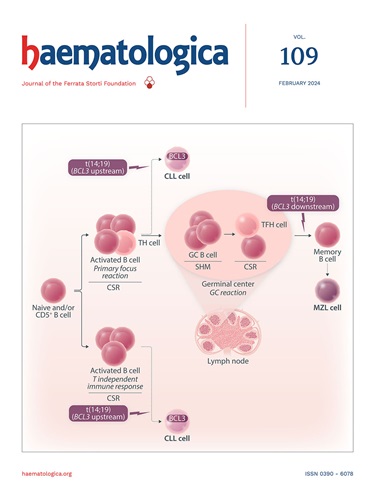s -腺苷蛋氨酸成瘾赋予kmt2a重排急性淋巴细胞白血病对蛋氨酸限制的敏感性。
IF 8.2
1区 医学
Q1 HEMATOLOGY
引用次数: 0
摘要
目前的强化化疗方案提高了儿童急性淋巴细胞白血病(ALL)的总生存率,但未能治愈一些高危患者亚群。我们观察到赖氨酸甲基转移酶2A (KMT2A)-重排白血病是一种预后不佳的侵袭性亚群,特别容易受到蛋氨酸循环的干扰。我们证明,这种蛋氨酸依赖性是由于对s -腺苷蛋氨酸(SAM)的需求增加,以维持KMT2A-r白血病的高甲基化状态。重要的促生存的KMT2A-r靶基因在蛋氨酸限制下被抑制,结合其他下游代谢变化,导致细胞快速死亡。FIDAS-5是一种口服活性蛋氨酸腺苷转移酶2A (MAT2A)抑制剂,可阻断SAM的产生,在患者来源的异种移植模型中成功地阻碍了白血病的进展,药物筛选显示MAT2A抑制剂和组蛋白去乙酰化酶抑制剂之间存在很强的协同作用。我们的研究结果表明,在KMT2A-r白血病中,蛋氨酸周期是一个可靶向的易感性,这可能会增加表观遗传靶向药物的功效。本文章由计算机程序翻译,如有差异,请以英文原文为准。
S-adenosylmethionine addiction confers sensitivity to methionine restriction in KMT2A-rearranged acute lymphoblastic leukemia.
Current intensive chemotherapy regimens have improved overall survival in pediatric acute lymphoblastic leukemia (ALL) but fail to cure some high-risk patient subgroups. We observed that lysine methyltransferase 2A (KMT2A)-rearranged leukemia, an aggressive subset with a dismal prognosis, is particularly vulnerable to perturbations of the methionine cycle. We demonstrate that this methionine dependency is driven by an increased need for S-adenosylmethionine (SAM) to maintain the hypermethylated state of KMT2A-r leukemias. Important pro-survival KMT2A-r target genes are repressed under methionine restriction, which, combined with other downstream metabolic changes, results in rapid cell death. FIDAS-5, an orally active methionine adenosyltransferase 2A (MAT2A) inhibitor that blocks SAM production, successfully impaired leukemia progression in patient-derived xenograft models, and a drug screen revealed strong synergy between MAT2A inhibition and histone deacetylase inhibitors. Our results identify the methionine cycle as a targetable vulnerability in KMT2A-r leukemia, which may increase the efficacy of epigenetic targeting agents.
求助全文
通过发布文献求助,成功后即可免费获取论文全文。
去求助
来源期刊

Haematologica
医学-血液学
CiteScore
14.10
自引率
2.00%
发文量
349
审稿时长
3-6 weeks
期刊介绍:
Haematologica is a journal that publishes articles within the broad field of hematology. It reports on novel findings in basic, clinical, and translational research.
Scope:
The scope of the journal includes reporting novel research results that:
Have a significant impact on understanding normal hematology or the development of hematological diseases.
Are likely to bring important changes to the diagnosis or treatment of hematological diseases.
 求助内容:
求助内容: 应助结果提醒方式:
应助结果提醒方式:


